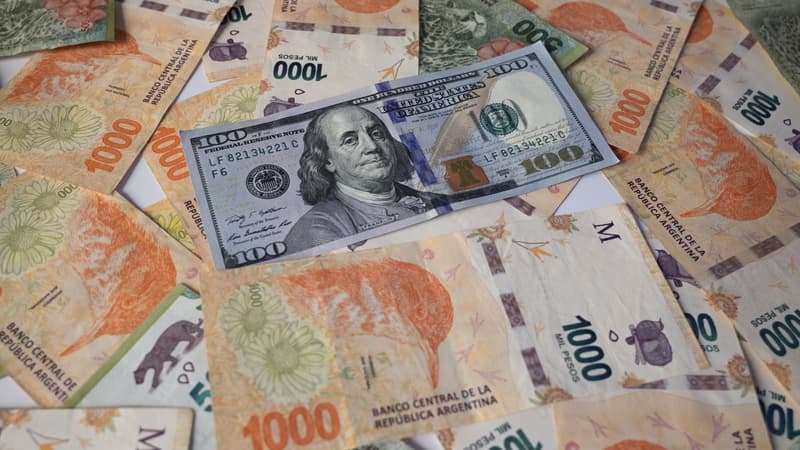The Argentine character was devalued by around 20% on Monday, in self-defense of the monetary authorities anticipating the reaction of the markets, and the first shock wave after the presidential primaries, which saw the ultraliberal and “anti-system” movements break out. candidate Javier Milei. Banco Nación, the country’s largest public bank, set the official peso exchange rate at 365.50 pesos to the dollar on Monday, after opening at 350, from 298.50 on Friday two days before the elections. . In one month, since mid-July, the peso has lost 38% of its value.
In the parallel exchange market, the peso traded in the afternoon at just over 680 per dollar.
Subsequently, the Central Bank announced a rise in interest rates on fixed-term deposits from 97% to 118%, its third strong rise in five months, “in line with the readjustment of the official exchange rate,” and with the in order to cushion “exchange expectations and minimize the impact on prices”. Several analysts had announced a nervous reaction from the financial markets and probable pressure on the peso, depending on the results of the primaries, which defined the parties and candidates called to contest the presidential elections on October 22.
drastic measure
The primaries thus forced the monetary authorities to take a drastic measure to defend the peso, while they had been proceeding for months with mild microdevaluations, known as “crawling peg” or “sliding exchange”, to bring the peso back to a rate more in line with the dollar. The third largest economy in Latin America is dealing with endemic inflation, which has been in double digits for more than twelve years and 115% in one year. It has already been at more than 50% since the beginning of 2023, with the July index expected and feared on Tuesday.
The devaluation of the peso “will return it to a rate closer to its fair value (…) but its fall runs the risk of accentuating inflationary pressures even more, perhaps up to 130-140%,” estimates the consultancy Capital Economics. The Argentine economy is “shaky,” she summarizes. Concerned about the prices of their suppliers in the coming days, after an increase already last week, Buenos Aires merchants preferred to close on Monday, like Marcela Monteagudo, manager of a sports store.
ultraliberal and libertarian
On Sunday, Javier Milei, 52, an ultra-liberal and libertarian economist, with radical proposals for deregulation and dollarization of the economy, and whose incendiary “anti-system” speech against the concerned “political caste”, caused a sensation by coming out first. primaries at the national level, with 30% of the votes.
He was ahead of Patricia Bullrich (28%), former Security Minister of Liberal President Mauricio Macri (2015-2019), who will be the candidate of the center-right opposition coalition. The Minister of Economy, Sergio Massa, will represent the government bloc (center-left), with 27% of the votes.
The primary sometimes has the value of a life-size poll, foreshadowing the outcome of the presidential election. But the small gap between the three main candidates maintains great uncertainty about the October ballot, due to the succession of Alberto Fernández (center-left), who does not appear. But the Minister of Economy is de facto weakened, while he is in constant talks with the IMF about the refinancing of Argentina’s debt with the Fund, inherited from a loan of 44,000 million dollars contracted in 2018 by the previous government.
budget goals
The IMF must confirm at the end of August the payment of 7,500 million dollars to the Argentine State as part of this plan, but the uncertainty arising from the primaries “raises questions” about “Sergio Massa’s ability to meet the objectives” Budgetary in approved with the Fund, estimates the independent analyst Carlos Fara. For Capital Economics, the increase in uncertainty will make it “more difficult for the government and the IMF to consider Argentina’s debt sustainable.”
However, the Fund welcomed on Monday “the recent actions and the commitment of the (Argentine) authorities in the direction of preserving stability, the reconstitution of foreign exchange reserves and the improvement of budgetary order,” said spokesperson Julie Kozack, without expressing yourself explicitly. she citing the measurements of the day.
Source: BFM TV


